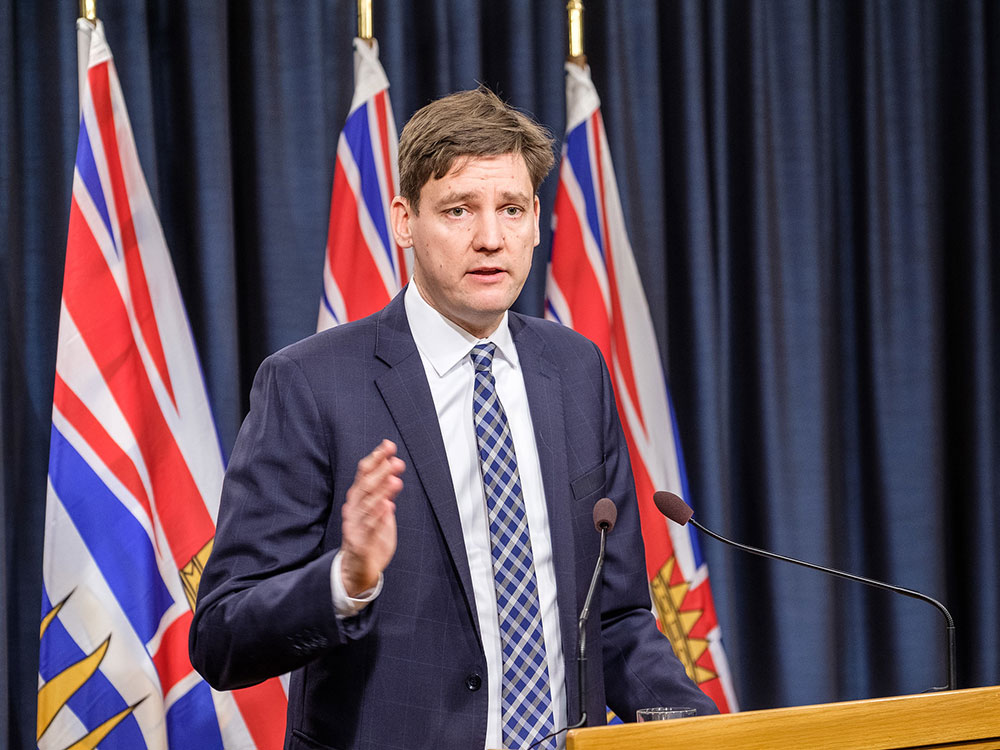After months of hints about his big plans to tackle the housing crisis, NDP leadership candidate David Eby finally released his housing platform today.
“Housing should first and foremost provide homes for people, not profits for investors,” said Eby at the North Vancouver launch of his platform, which took place in front of a proposed 85-unit development that will include below-market housing.
“We’ve made progress by taxing speculation and building thousands of new homes, but across this province I see the desperate need to do much more to bring down the costs of housing.”
The platform is a wide-ranging document, covering positions Eby’s staked during his time as housing critic and as housing minister. It includes everything from a crackdown on speculative activity to supports for builders of affordable housing like non-profits.
The biggest shake-up is Eby’s plan for the province to muscle into municipalities’ turf to densify single-family neighbourhoods in response to the worsening housing crisis.
Eby’s signals of such an action in the past few months have drawn protests from local politicians.
Specifically, he said he was interested in a move by New Zealand to effectively eliminate single-family home zoning by requiring its five largest cities to allow property owners to build up to three housing units on most single-family lots.
Eby’s platform calls for secondary suites to be made legal in every municipality in B.C. and to allow homebuilders in major urban centres to replace a single-family home with up to three units on the same lot without requiring municipal approval.
If municipalities fail to meet minimum quotas for homes needed to keep up with demand, the platform threatens “provincial intervention.”
However, it also promises rewards for those that exceed their targets.
Thom Armstrong, CEO of the Co-operative Housing Federation of BC, expects “howls” from the 30-plus municipalities that haven’t built a single unit of rental housing in six years.
“We’re two weeks from the municipal election,” said Armstrong, who’s curious to see if any candidates will “try to play off this announcement by endorsing it… or want to tilt against it.”
Eby is also promising to introduce a new government program called BC Build to build “attainable middle-class” housing.
He says the province would work with First Nations and municipalities to speed these multi-family buildings through the approvals process, zone land for higher-density housing and use low-interest government financing to help make the projects actually affordable to B.C. residents. Under the plan, provincially owned land would be made available for new housing.
Eby also wants to earmark $500 million to buy existing older rental apartment buildings to protect them as affordable housing.
“It’s not just for preservation, it sets the stage for new supply,” said Armstrong, who’s excited to see those buildings taken out of the private market so they can be redeveloped in the future as non-market housing.
The platform proposes giving non-profit housing providers first dibs on these rental properties, as many of them are currently snapped up by big investors like international corporations.
This would give housing providers a “fighting chance” to acquire them, says Armstrong, “in a game that’s played by people with deep-pockets who are able to move at lightning speed.”
As for solutions to cool the real estate market, Eby is proposing a flipping tax intended to slow down rapid sales that drive up prices. The tax will apply to homes that are sold within two years of the purchase date. It will operate on a sliding scale: the longer an owner holds onto the property, the lower the tax.
During his time as the NDP’s housing critic, Eby was known for speaking out against suspicious real estate activity. This messaging was toned down during his time as housing minister, but the platform promises a number of solutions that respond to problems he cited during his time as critic. Eby singled out “speculators and tax cheats” as targets of the change.
The platform promises: a new enforcement tool to investigate suspicious property transactions; a new provincial tax enforcement team to identify people who declare poverty-level incomes but buy multimillion-dollar properties; seizing properties purchased with the proceeds of crime and using the revenue to fund public programs; and the closing of loopholes that enable billionaires and big corporations to avoid taxes, such as the use of “bare trusts.” The loophole allowed owners to avoid no payment of the property transfer or foreign buyers taxes.
Eby toured the province after announcing he would run for leader. This is his first major policy announcement.
All in all, the platform is a “game changer,” said Armstrong.
“What sets this apart is how comprehensive it is. It’s about supply. It’s about demand. It’s about the relationship between provinces and municipalities. It’s about engagement with Indigenous communities. It’s got something for everybody.”
It also shows the extent of solutions that someone can propose as premier, he adds.
“It puts the opposition in a tight corner. If you don’t want to do this, what’s your plan? And it better be more sophisticated than unleashing the private sector to create this tsunami of supply to trickle down. We’ve seen that movie before.”
Eby was expected to be a shoo-in as NDP leader, but he’s facing increasing competition from climate activist Anjali Appadurai, who has racked up party signups in support of her campaign. ![]()
Read more: BC Politics, Housing


















Tyee Commenting Guidelines
Comments that violate guidelines risk being deleted, and violations may result in a temporary or permanent user ban. Maintain the spirit of good conversation to stay in the discussion.
*Please note The Tyee is not a forum for spreading misinformation about COVID-19, denying its existence or minimizing its risk to public health.
Do:
Do not: